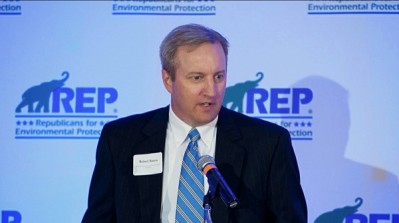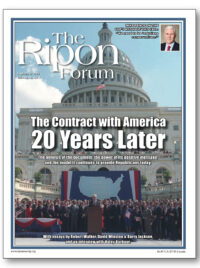A legacy waiting to be fulfilled
At a time when Republicans are being criticized for showing indifference toward the environment, it is worth noting that the party has a rich legacy on the issue on which party leaders can build.
The GOP’s great conservation legacy began with the first Republican president, Abraham Lincoln, who set aside the Yosemite Valley for the enjoyment of future generations of Americans. Lincoln’s successor, U.S. Grant, established the  world’s first national park—Yellowstone—the cornerstone of what Ken Burn’s called “America’s Best Idea”.
world’s first national park—Yellowstone—the cornerstone of what Ken Burn’s called “America’s Best Idea”.
Theodore Roosevelt is revered to this day, more than 100 years after his presidency, for his bold foresight in conservation of our natural resources. Roosevelt protected 10 percent of the Lower 48 land mass and created five national parks, 150 national forests, and 55 wildlife refuges. If there is a secular patron saint of conservation, it is TR.
Dwight Eisenhower conserved land now known as the Arctic National Wildlife Refuge. Nearly two decades later, Ike’s Vice President, Richard Nixon, become the greatest environmental president in our history. Nixon signed into law the Environmental Protection Agency, National Environmental Policy Act, Endangered Species Act, and Clean Air Act of 1970.
After Nixon’s resignation, Gerald Ford — who served as a summer ranger in Yellowstone when he was 23 years old – picked up the mantle on environmental issues by enacting the first auto fuel standards, the Safe Drinking Water Act, and 18 national parks.
Perhaps the most unsung hero in the litany of Republican conservationists is Ronald Reagan.
Perhaps the most unsung hero in the litany of Republican conservationists is Ronald Reagan. He protected more than 10 million acres of wilderness. His greatest contribution, though, was completing the Montreal Protocol. Reagan’s political advisers were at odds with his scientific advisers. Reagan sided with the scientists and urged his negotiators to get the treaty done. That accord has prevented the release of more greenhouse gases than any other act.
Reagan’s successor as President, George H.W. Bush, signed the Clean Air Act Amendments of 1990 to tackle three major problems: acid rain, urban air pollution, and toxic air emissions. “41”rolled up his sleeves to tackle not-so-glamorous work of cleaning up the Exxon Valdez spill, our largest coastal harbors, and military bases. His declaration of “no net loss of wetlands” pays dividends today to municipalities and communities in the form of lower infrastructure costs. Bush also convened the first-ever national conference on climate change.
The remarkable conservation legacy of the GOP isn’t limited to the White House. Gifford Pinchot created forestry as a profession and the U.S. Forest Service while serving in the Roosevelt administration. Iowa Republican John Lacey gave us “The Lacey Act”, for which every fan of wildlife should be thankful. John Saylor, a Republican from Pennsylvania coal country, rallied support for The Wilderness Act of 1964 and the Wild and Scenic Rivers Act. The legacy continues today in state houses, governor mansions, and in the 113th Congress, where seven Republican-sponsored wilderness bills await action. In July, 104 Republican co-sponsors joined Pennsylvania Republican Jim Gerlach in passing the Conservation Easement Incentive Act to make permanent the tax deduction for that critical land stewardship tool.
Unfortunately, the popular narrative is that the GOP’s only environmental goal is to pave over paradise and put up a parking lot. That’s our fault—we ceded the narrative to the opposition, green groups, and even supportive conservative groups which constantly beam the false choice of a healthy economy over a healthy environment into our living rooms.
Unfortunately, the popular narrative is that the GOP’s only environmental goal is to pave over paradise and put up a parking lot. That’s our fault — we ceded the narrative to the opposition.
Without prompt attention to rehabilitating that tarnished image, the GOP could get lost in the political wilderness. Polling shows that a clear majority and growing numbers of Americans are concerned about climate change. Nowhere is this concern accelerating faster than among faith and millennial voters as they sense a moral call for action and that a healthy environment is a priority.
A 2013 study by Yale’s Anthony Leiserowitz, for example, found that 61% of evangelical Christians believe climate change is happening. More telling, 90% of those surveyed support federal funding for renewable energy research and more than 70% support regulating carbon emissions. According to an ABC News June 2014 poll, 68% of white Catholic voters view global warming as a serious problem. The same poll found 7 in 10 Americans view it as a serious problem—enough to support broad efforts to curb greenhouse gas emissions. Harstad Strategic Research reported earlier this year that millennials strongly support protecting the environment from pollution (76%) and addressing climate change (69%).
 In its 2014 spring report, George Mason University’s Center for Climate Change Communications reported that Americans are two times more likely to vote for a presidential candidate who strongly supports action to address climate change.
In its 2014 spring report, George Mason University’s Center for Climate Change Communications reported that Americans are two times more likely to vote for a presidential candidate who strongly supports action to address climate change.
Ceding the conversation on climate change isn’t an option.
The left has drawn a line in the tar sands over the Keystone XL pipeline. They are wrong. The pipeline is the most environmentally friendly and safest method to transport oil and gas. The left prefers the oil be dangerously shipped up and over mountains and across a roiling ocean to countries that have sub-standard pollution and emissions rules. Keystone is a compelling pro-environment story we need to tell over and over.
Anyone who paid attention to the way the left handled healthcare realizes we can ill afford to let them craft a national energy strategy. We need Republican leadership.
The economics of moving to a clean energy future are difficult to negotiate. Millions of Americans work in the fossil fuel industry, invest in those firms directly or through mutual funds or retirement plans, and hundreds of communities depend upon those industries to provide infrastructure and services. A Republican strategy would insure those who depend up those industries will have a secure future by a concentrated effort to learn how to use those fuels more cleanly.
Thanks largely to our booming domestic natural gas industry, we’ve lowered our greenhouse gas emissions by 12% to 1994 levels. Continued investment in infrastructure and conversion of our economy to run on natural gas will strengthen our economy and continue to improve the climate picture. Exporting liquefied natural gas and the technology to extract gas to other countries helps address global emissions and is another way to fortify our own economy.
Meanwhile, we should work to unshackle all forms of energy, including nuclear, wind, solar, and bio-fuels from market distorting regulations, bureaucracy, and taxes by deploying free market forces to achieve reductions in pollution with economic growth.
A GOP call to convene our brightest minds to proffer market-based actions to curb carbon emissions, promote R&D, and loosen the regulatory anchor chained to our economy could set the stage for generations of new economic growth.
And it would signal the marketplace—the American electorate—that the climate has changed inside the Beltway.
___________________________________
Rob Sisson is President of ConservAmerica, a national grassroots organization. Prior to joining ConservAmerica, he spent 22 years in commercial banking and, in 2000, was named Michigan’s Small Business Advocate of the Year. He also served two terms as Mayor of Sturgis, Michigan.




